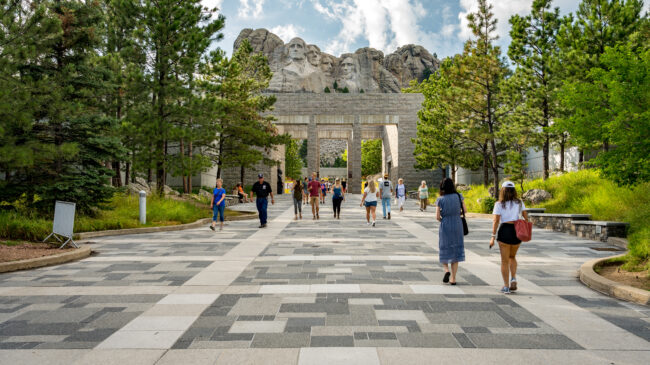South Dakota’s Measure 27 would legalize the possession, distribution, and use of marijuana for persons 21 years of age and older.
Summary
South Dakota’s Measure 27 is a statutory initiative that would legalize the use of marijuana for adults aged 21 and older. South Dakotans would gain the right to possess up to one ounce of marijuana or eight grams of marijuana concentrates and gift up to those amounts to another adult without compensation. Residents of counties or cities that do not have a licensed marijuana retailer would additionally gain the right to cultivate up to three plants per person or a maximum of six plants per household.
The ballot initiative would also protect an employer’s right to institute drug-free workplace policies and would not require employers to accommodate an employee’s marijuana use. It would allow owners of private property to prohibit marijuana cultivation or consumption on their property. It would also impose small administrative fines for individuals who cultivate marijuana without keeping it locked or invisible to the public and allow fines on adults who smoke marijuana in public places.
Fiscal Impact
Measure 27 imposes no taxes and requires no spending by state or local governments because it does not authorize a commercial system in need of licensing or administration. Therefore, the ballot initiative has no direct fiscal impact on taxpayers.
Proponents’ Arguments For
Measure 27 is sponsored by South Dakotans for Better Marijuana Laws. In 2020, this organization also sponsored Amendment A, a proposed state constitutional amendment to legalize marijuana and authorize a commercial marketplace. Amendment A passed with 54% of the vote but was subsequently challenged by Pennington County Sheriff Kevin Thom and Highway Patrol Superintendent Rick Miller with the support of South Dakota Gov. Kristi Noem. Their lawsuit alleged that Amendment A was deficient because it violated the single-subject limitation for ballot initiatives and amounted to a revision of the state constitution rather than an amendment. In Feb. 2021, a circuit court agreed with the plaintiffs on both claims and struck down Amendment A before it could be implemented.
Proponents responded by crafting Measure 27 as a much simpler initiative. Measure 27 is statutory rather than constitutional, so it cannot be challenged on the revision grounds used to challenge Amendment A. It also foregoes related provisions that had been included in Amendment A in order to avoid violating the single-subject restriction. Whereas Amendment A provided some regulatory guidance for a commercial market, an excise tax rate, local government regulations, and provided for hemp and medical marijuana markets, Measure 27 is silent on all these subjects. Presumably, the South Dakota legislature would need to enact a follow-on statute in order to create any of these provisions in the event voters approve Measure 27.
Opponents’ Arguments Against
The only organized opposition to Measure 27 is a committee called Protecting South Dakota Kids that claims “Legal marijuana will destroy our communities.” This organization also worries that legal marijuana could be profitable on a commercial basis and might attract investment from large, established firms in existing vice industries from other parts of the country, including “New York City hedge fund managers.” They also assert that marijuana products today are more potent than those that were distributed at Woodstock in 1969. Finally, opponents of Measure 27 claim that more minority children have been arrested in Colorado since that state legalized marijuana and that car crashes and youth marijuana use have increased in states with legal cannabis markets.
Additional Discussion
South Dakota’s Measure 27 was designed to accomplish the most basic facet of Amendment A without implicating any of the bases on which Amendment A was overturned. If approved, Measure 27 would give South Dakotans the right to possess up to one ounce of marijuana.
While this approach may be a legal necessity in order to secure victory on a ballot question, the measure’s wording may also leave South Dakotans who want to legalize marijuana in a sort of legal limbo since they will have no place to legally buy the products they gain the ability to possess. While it’s possible the South Dakota legislature could establish a commercial system and regulatory apparatus for legalized marijuana following approval of Measure 27, this is not guaranteed.
The District of Columbia has also legalized the possession of marijuana without providing for a commercial system, and providers have been periodically raided by local police for illegally distributing marijuana that citizens are legally permitted to possess. Police say they are responding to neighborhood complaints, not targeting legal cannabis businesses, but similar inconsistencies have persisted for extended time periods in other states. After Nevada amended its constitution to protect citizens’ right to medical marijuana in 2000, for example, it took 13 years before the state legislature authorized a commercial marijuana system to satisfy this demand, despite express requirements for the legislature to do so.
The ability to cultivate some marijuana plants at home and share harvested marijuana with other adults would satisfy at least some of the demand for marijuana, although home cultivation has been largely insufficient to meet demand in other states, as evidenced by large volumes of commercial sales.
As for concerns about crime and safety, real-world data has shown that marijuana legalization has had no measurably strong effect on crime, road safety, or economic outcomes in the states that have legalized it. Marijuana use by high-school-aged youth has remained flat or fallen in states that have implemented regulated cannabis markets.
Given what appeared to be coordinated opposition to Amendment A among elected officials following the 2020 election, Measure 27 might be South Dakota’s best chance in the near-term to legalize marijuana for adult use.

